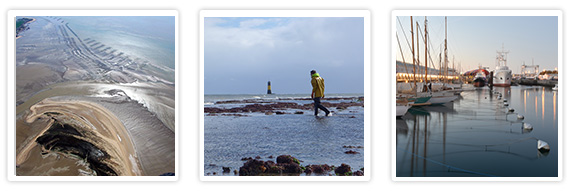LIttoral, ENvironment and Societies (LIENSs) - UMR 7266
The LIENSs laboratory is a joint interdisciplinary research unit (UMR 7266) under the joint supervision of La Rochelle University and the CNRS.
LIENSs focuses its research on the functioning of the coastal zone, its evolution over time and particularly in the current context of global change and increasing urbanization of the coasts, and its sustainable use and exploitation.

A common issue: the coastline
Research at LIENSs addresses several fundamental questions
- How does the coastal system function on all scales, from the molecular to the global, from a physical, chemical, biological and societal point of view? How do different scales of space and time and different contexts interact?
- How is the coastal system evolving in a context of global change and increasing anthropogenic pressure? How do the various components of the system adapt to change? How have coastal societies adapted in the past? How can we predict, anticipate and support these changes?
- What are the interactions between coastal societies and territories?
- How can we make sustainable use of coastal resources, particularly for health purposes?
The research carried out in our laboratory focuses on the problem of adapting to changes - whether geophysical, chemical, biological, ecological or societal - in a coastal zone, in the broadest sense of the term, which is changing under anthropic pressure in a context of climate change.
LIENSs presently comprises 82 researchers/lecturer-researchers, 33 permanent engineers/technicians, 24 post-docs and invited researchers, 10 contracted technical staff and 50 PhD students.
Scientific structure
The research unit LIENSs, established on January 1, 2008, was created by joining 4 laboratories concerned by various disciplinary fields : Humanities and Social Sciences, Environmental Sciences and Engineering Sciences, focusing mainly on one object under study : the littoral zone.
LIENSs presently includes 6 research teams :
– Approach by Geography : Islands, Littoral areas and Environment (AGILE)
– Physical Dynamics of the Littoral zone (DPL)
– Biodiversity and Functioning of Coastal Ecosystems) (BIOFEEL)
– Marine animals responses to environmental variability (AMARE)
– Biotechnologies and Chemistry applied to Bioresources for Health applications (BCBS)
– SpacEs, Societies, TerritoRies of Ancient and New shores (ESTRAN)
Four cross-axes (Coastline changes ; Status indices of littoral ecosystems ; Management and valuation of marine ressources ; Microbial biofilms) allow to develop integrated studies between teams and 2 methodological workgroups, Ecological tracers and GIS) enable lab staff to develop up-to-date methods in these fields.
Resarch activities are supported by 9 analytical facilities managed by teams and 6 common analytical or logistical platforms.
Regulatory authorities : CNRS (INEE, INSU, INSHS) - University of La Rochelle




